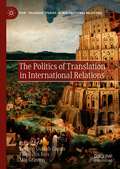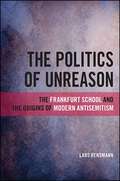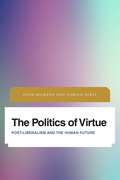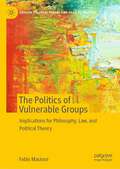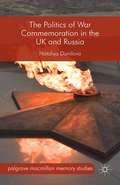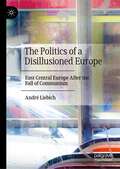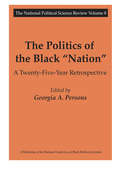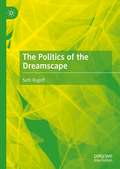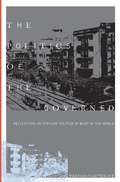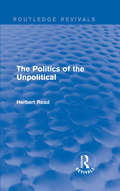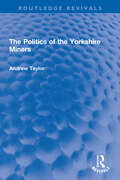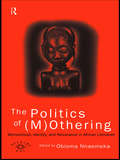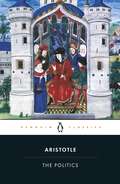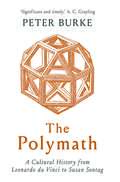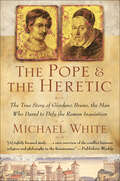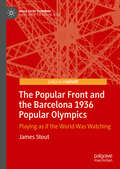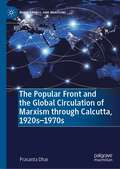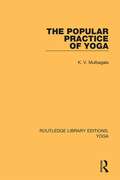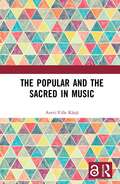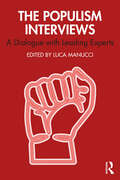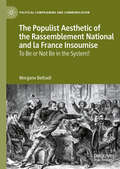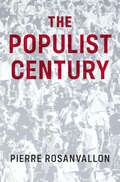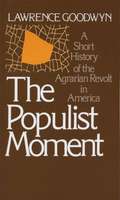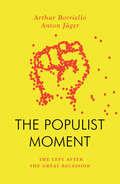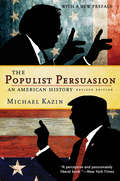- Table View
- List View
The Politics of Translation in International Relations (Palgrave Studies in International Relations)
by Zeynep Gulsah Capan Filipe Dos Reis Maj GrastenThis volume concerns the role and nature of translation in global politics. Through the establishment of trade routes, the encounter with the ‘New World’, and the circulation of concepts and norms across global space, meaning making and social connections have unfolded through practices of translating. While translation is core to international relations it has been relatively neglected in the discipline of International Relations. The Politics of Translation in International Relations remedies this neglect to suggest an understanding of translation that transcends language to encompass a broad range of recurrent social and political practices. The volume provides a wide variety of case studies, including financial regulation, gender training programs, and grassroot movements. Contributors situate the politics of translation in the theoretical and methodological landscape of International Relations, encompassing feminist theory, de- and post-colonial theory, hermeneutics, post-structuralism, critical constructivism, semiotics, conceptual history, actor-network theory and translation studies. The Politics of Translation in International Relations furthers and intensifies a cross-disciplinary dialogue on how translation makes international relations.
The Politics of Unreason: The Frankfurt School and the Origins of Modern Antisemitism (SUNY series, Philosophy and Race)
by Lars RensmannAlthough the Frankfurt School represents one of the most influential intellectual traditions of the twentieth century, its multifaceted work on modern antisemitism has so far largely been neglected. The Politics of Unreason fills this gap, providing the first systematic study of the Frankfurt School's philosophical, psychological, political, and social research and theorizing on the problem of antisemitism. Examining the full range of these critical theorists' contributions, from major studies and prominent essays to seemingly marginal pieces and aphorisms, Lars Rensmann reconstructs how the Frankfurt School, faced with the catastrophe of the genocide against the European Jews, explains forms and causes of anti-Jewish politics of hate. The book also pays special attention to research on coded and "secondary" antisemitism after the Holocaust, and how resentments are politically mobilized under conditions of democracy. By revisiting and rereading the Frankfurt School's original work, this book challenges several misperceptions about critical theory's research, making the case that it provides an important source to better understand the social origins and politics of antisemitism, racism, and hate speech in the modern world.
The Politics of Virtue: Post-Liberalism and the Human Future
by John Milbank Adrian PabstContemporary politics is dominated by a liberal creed that champions negative liberty and individual happiness. This creed undergirds positions on both the right and the left free-market capitalism, state bureaucracy and individualism in social life. The triumph of liberalism has had the effect of subordinating human association and the common good to narrow self-interest and short-term utility. By contrast, post-liberalism promotes individual fulfillment and mutual flourishing based on shared goals that have more substantive content than the formal abstractions of liberal law and contract, and yet are also adaptable to different cultural and local traditions. In this important book, John Milbank and Adrian Pabst apply this analysis to the economy, politics, culture, and international affairs. In each case, having diagnosed the crisis of liberalism, they propose post-liberal alternatives, notably new concepts and fresh policy ideas. They demonstrate that, amid the current crisis, post-liberalism is a program that could define a new politics of virtue and the common good.
The Politics of Vulnerable Groups: Implications for Philosophy, Law, and Political Theory (Critical Political Theory and Radical Practice)
by Fabio MacioceThis book describes and analyzes the conceptual ambiguity of vulnerability, in an effort to understand its particular applications for legal and political protection when relating to groups. Group vulnerability has become a common concept within legal and political scholarship but remains largely undertheorized as a phenomenon itself. At the same time, in academia and within legal circles, vulnerability is primarily understood as a phenomenon affecting individuals, and the attempts to identify vulnerable groups are discredited as essentialist and stereotypical. In contrast, this book demonstrates that a conception of group vulnerability is not only theoretically possible, but also politically and legally necessary. Two conceptions of group vulnerability are discussed: one focuses on systemic violence or oppression directed toward several individuals, while another requires a common positioning of individuals within a given context that conditions their agency, ability to cope with risks and uncertainties, and manage their consequences. By comparing these two definitions of group vulnerability and their implications, Macioce seeks a more precise delineation of the theoretical boundaries of the concept of group vulnerability.
The Politics of War Commemoration in the UK and Russia (Palgrave Macmillan Memory Studies)
by Nataliya DanilovaThis book analyses contemporary war commemoration in Britain and Russia. Focusing on the political aspects of remembrance, it explores the instrumentalisation of memory for managing civil-military relations and garnering public support for conflicts. It explains the nexus between remembrance, militarisation and nationalism in modern societies.
The Politics of a Disillusioned Europe: East Central Europe After the Fall of Communism
by André LiebichMoving from the fall of the Berlin Wall in 1989 to the present day, this book traces the trajectory of the six East Central European former satellites of the Soviet Union (Poland, Hungary, the Czech Republic, Slovakia, Romania, Bulgaria) that have joined the European Union. It seeks in particular to explain these countries’ disenchantment with the “return to Europe” in spite of their significant advances. The book proceeds country by country and then devotes chapters to some contemporary issues, such as minorities, migration, and the relations of these “new” members with the European Union as a whole. The book eschews theory and is intended for a general audience, including students at all levels in political science and history classes devoted to the EU and to contemporary Europe, and to an academic and practitioner audience interested in world affairs and the evolution of the European Union. The book strives to fill a persistent knowledge gap in the English-speaking world concerning East Central Europe, and to offer fresh insights about the region in the context of contemporary geopolitics.
The Politics of the Black Nation: A Twenty-five-year Retrospective (National Political Science Review Ser.)
by Georgia A. PersonsThis volume of the National Political Science Review, the official publication of the National Political Science Association, is anchored by a major symposium on The Politics of the Black "Nation," the book authored by Matthew Holden in 1973, which is now considered one of the most influential books in the field of black politics. Twenty-five years provide a sufficient timespan on which to base a retrospective of the book and simultaneously to reflect upon the evolution of the black liberation struggle, more formally called, African American politics. In the present age, there is not much talk about "a black nation," certainly not as was heard during the 1960s and mid-1970s. Yet there is a persistent sense of separateness in that there is constant thought and talk of "Black America" as a significantly separate communal entity. Black Americans are seen as a racially and culturally distinct community holding to social, political, economic interests which have special significance and poignancy for them. Holden's perception of the nature of the times in the early seventies stands in sharp contrast to how contemporary analysts of African American politics tend to perceive the nature of African Americans' role in political life and their position in American society in the present age. In this retrospective, readers have the opportunity to get a sense of what Holden argued of the seven essays that make up his seminal volume and to consider how well Holden's observations have stood the tests of time. In addition to the essays presented at the symposium, which pointedly discuss Holden's work, there are essays dealing with "African American Politics in Constancy and Change," by contributors including Charles Henry, David Covin, Robert C. Smith, Clyde Lusane, Cheryl Miller, D'Linell Finley, and Sekou Franklin, among others. Other features are a highly informative discussion of the Literary Digest magazine's Straw-Vote Presidential Polls, 1916-1936, and a
The Politics of the Dreamscape
by Seth RogoffThis book traces the intersection of dreams and power in order to analyze the complex ways representations of dreams and paradigms of dream interpretation reinforce and challenge authoritarian, hierarchical structures. The book puts forward the concept of the dreamscape as a pre-representational space that contains anarchistic attributes, including its instability or chaotic nature and the lack of a stable or core selfhood and identity in its subjects. The book situates this concept of the dreamscape through an analysis of the Daoist notions of the “transformation of things” and hundun (chaos) and the biblical concept of tehom (the deep). Using this conceptual framework, this book analyzes paradigmatic moments of dream interpretation along a spectrum from radical, anarchist assertions of the primal dreamscape to authoritarian dream-texts that seek to reify identity, define and establish hierarchy, and support coercive relationships between unequal subjects. The book’s key figures include William Blake, Robert Frost, Jacob and Joseph from Genesis, Sigmund Freud, Carl Jung, Jean Rhys, Franz Kafka, and the neurobiologist J. Allan Hobson
The Politics of the Governed: Reflections on Popular Politics in Most of the World (Leonard Hastings Schoff Lectures)
by Partha ChatterjeeOften dismissed as the rumblings of "the street," popular politics is where political modernity is being formed today, according to Partha Chatterjee. The rise of mass politics all over the world in the twentieth century led to the development of new techniques of governing population groups. On the one hand, the idea of popular sovereignty has gained wide acceptance. On the other hand, the proliferation of security and welfare technologies has created modern governmental bodies that administer populations, but do not provide citizens with an arena for democratic deliberation. Under these conditions, democracy is no longer government of, by, and for the people. Rather, it has become a world of power whose startling dimensions and unwritten rules of engagement Chatterjee provocatively lays bare.This book argues that the rise of ethnic or identity politics—particularly in the postcolonial world—is a consequence of new techniques of governmental administration. Using contemporary examples from India, the book examines the different forms taken by the politics of the governed. Many of these operate outside of the traditionally defined arena of civil society and the formal legal institutions of the state. This book considers the global conditions within which such local forms of popular politics have appeared and shows us how both community and global society have been transformed. Chatterjee's analysis explores the strategic as well as the ethical dimensions of the new democratic politics of rights, claims, and entitlements of population groups and permits a new understanding of the dynamics of world politics both before and after the events of September 11, 2001.The Politics of the Governed consists of three essays, originally given as the Leonard Hastings Schoff Lectures at Columbia University in November 2001, and four additional essays that complement and extend the analyses presented there. By combining these essays between the covers of a single volume, Chatterjee has given us a major and urgent work that provides a full perspective on the possibilities and limits of democracy in the postcolonial world.
The Politics of the Unpolitical (Routledge Revivals: Herbert Read and Selected Works)
by Herbert ReadIn this collection of fourteen essays, first published in 1943, Herbert Read extends and amplifies the points of view expressed in his successful pamphlet To Hell with Culture, which has been reprinted here. The ‘politics of the unpolitical’ are the politics of those who strive for human values and not for national or sectional interests. Herbert Read defines these values and demands their recognition as a solvent of social and cultural crises’, and looks forward to the future with constructive vision. This book will be of interest to students of politics, history, and philosophy.
The Politics of the Yorkshire Miners (Routledge Revivals)
by Andrew TaylorFirst published in 1984, The Politics of the Yorkshire Miners examines all aspects of political activity of the Yorkshire Area of the NUM. The book was written using original research from the archives of the Yorkshire Area combined with the author’s personal experience. It explores developments from 1945 onwards, and looks at internal politics within the Area, discussing the nature of policies on both industrial bargaining and wider political aims. It considers the role of sponsored MPs and their relationship to the Area, as well as the NUM’s ‘special relationship’ with the Labour Party. The structure of the Area and its role within the NUM nationally are also discussed, and detailed analysis is given to the strikes of 1972 and 1974.
The Politics of: Womanhood, Identity and Resistance in African Literature (Opening Out: Feminism for Today)
by Obioma NnaemekaThis collection is a study of African literature framed by the central, and multi-faceted, idea of 'mother' - motherland, mothertongue, motherwit, motherhood, mothering - looking at the paradoxical location of (m)other as both central and marginal. Whilst the volume stands as a sustained feminist analysis, it engages feminist theory itself by showing how issues in feminism are, in African literature, recast in different and complex ways.
The Politics: Introduction To The Politics
by AristotleTwenty-three centuries after its compilation, 'The Politics' still has much to contribute to this central question of political science. Aristotle's thorough and carefully argued analysis is based on a study of over 150 city constitutions, covering a huge range of political issues in order to establish which types of constitution are best - both ideally and in particular circumstances - and how they may be maintained. Aristotle's opinions form an essential background to the thinking of philosophers such as Thomas Aquinas, Machiavelli and Jean Bodin and both his premises and arguments raise questions that are as relevant to modern society as they were to the ancient world.
The Polymath: A Cultural History from Leonardo da Vinci to Susan Sontag
by Peter BurkeThe first history of the western polymath, from the fifteenth century to the present day From Leonardo Da Vinci to John Dee and Comenius, from George Eliot to Oliver Sacks and Susan Sontag, polymaths have moved the frontiers of knowledge in countless ways. But history can be unkind to scholars with such encyclopaedic interests. All too often these individuals are remembered for just one part of their valuable achievements. In this engaging, erudite account, renowned cultural historian Peter Burke argues for a more rounded view. Identifying 500 western polymaths, Burke explores their wide-ranging successes and shows how their rise matched a rapid growth of knowledge in the age of the invention of printing, the discovery of the New World and the Scientific Revolution. It is only more recently that the further acceleration of knowledge has led to increased specialisation and to an environment that is less supportive of wide-ranging scholars and scientists. Spanning the Renaissance to the present day, Burke changes our understanding of this remarkable intellectual species.
The Pope & the Heretic: The True Story of Giordano Bruno, the Man Who Dared to Defy the Roman Inquisition
by Michael WhiteThe story of the trial of visionary philosopher Giordano Bruno. “A nice overview of the conflict between religion and philosophy in the Renaissance.” —Publishers WeeklyGiordano Bruno challenged everything in his pursuit of an all-embracing system of thought. This not only brought him patronage from powerful figures of the day but also put him in direct conflict with the Catholic Church. Arrested by the Inquisition and tried as a heretic, Bruno was imprisoned, tortured, and, after eight years, burned at the stake in 1600. The Vatican “regrets” the burning yet refuses to clear him of heresy.But Bruno’s philosophy spread: Galileo, Isaac Newton, Christiaan Huygens, and Gottfried Leibniz all built upon his ideas; his thought experiments predate the work of such twentieth-century luminaries as Karl Popper; his religious thinking inspired such radicals as Baruch Spinoza; and his work on the art of memory had a profound effect on William Shakespeare.Chronicling a genius whose musings helped bring about the modern world, Michael White pieces together the final years—the capture, trial, and the threat the Catholic Church felt—that made Bruno a martyr of free thought.“White’s book is exemplary for its discussions of the period’s intellectual beliefs and social structure and for its vivid detail and illuminating look at Bruno’s trial and subsequent death.” —Library Journal“Riveting.” —Birmingham Post
The Popular Front and the Barcelona 1936 Popular Olympics: Playing as if the World Was Watching (Mega Event Planning)
by James StoutThis book deals with the events leading up to the 1936 Popular Olympics which would have united the Popular Front in opposition to the Berlin Olympics. It also discusses the days after the outbreak of the Spanish Civil War which began on the same day the games were due to start. Using a variety of primary and secondary sources, the book traces the biographies of several Popular Olympians who would go on to volunteer in the Spanish Civil War. The book also examines the planned events and locations for the Popular Olympics as well as the international funding that the games secured. The book argues that the events were a departure from Workers’ Sport as well as the IOC’s Olympic games and represented an important cultural manifestation of the Popular Front.
The Popular Front and the Global Circulation of Marxism through Calcutta, 1920s-1970s (Marx, Engels, and Marxisms)
by Prasanta DharThis book examines the global circulation of Marxism seen from one of its most highly charged sites: Calcutta in India. Building on but also revising existing approaches to global intellectual history, the book presents the circulation of Marxism through Calcutta as a historically-sited problem of mass mediation. Using tools from media studies, the book explores the way that Marxism was presented to the public, the technologies used, and the meanings of Marxism in twentieth-century Calcutta. Demonstrating how the Popular Front was split between the so-called 'people's group' and those whom were called 'intellectuals', the book argues that the people's group generally identified themselves as Marxists and preferred audio-visual media such as theatre, while the so-called intellectuals privileged academic rigour and print media, usually referring to themselves as Marxians. Thus, the author reveals a polyphony of Marxisms in the Popular Front. Tracing Marxism back to the Bengal Renaissance and the Swadeshi and Naxal movements, this book shows how debate around the meaning of 'Marxism' continued throughout the 1970s in Calcutta, and eventually engendered the historiographical movement that has come to be known as Subaltern Studies.
The Popular Practice of Yoga (Routledge Library Editions: Yoga #6)
by K.V. MulbagalaThis book, first published in 1935, is an early western study of the practice of yoga. It examines the theories of yoga, and attempts to understand and explain its philosophy and beliefs.
The Popular and the Sacred in Music
by Antti-Ville KärjäMusic, as the form of art whose name derives from ancient myths, is often thought of as pure symbolic expression and associated with transcendence. Music is also a universal phenomenon and thus a profound marker of humanity. These features make music a sphere of activity where sacred and popular qualities intersect and amalgamate. In an era characterised by postsecular and postcolonial processes of religious change, re-enchantment and alternative spiritualities, the intersections of the popular and the sacred in music have become increasingly multifarious. In the book, the cultural dynamics at stake are approached by stressing the extended and multiple dimensions of the sacred and the popular, hence challenging conventional, taken-for-granted and rigid conceptualisations of both popular music and sacred music. At issue are the cultural politics of labelling music as either popular or sacred, and the disciplinary and theoretical implications of such labelling. Instead of focussing on specific genres of popular music or types of religious music, consideration centres on interrogating musical situations where a distinction between the popular and the sacred is misleading, futile and even impossible. The topic is discussed in relation to a diversity of belief systems and different repertoires of music, including classical, folk and jazz, by considering such themes as origin myths, autonomy, ingenuity and stardom, authenticity, moral ambiguity, subcultural sensibilities and political ideologies.
The Populism Interviews: A Dialogue with Leading Experts
by Luca ManucciThe Populism Interviews features interviews with many of the leading experts on this most controversial of issues. Populism is a widely debated topic, and it generates interest across the globe. As a result, a burgeoning literature deals with many aspects of populism and its links to pressing issues such as media freedom, minority rights and separation of powers. To make sense of such a complex subject, this book presents interviews with some of the leading experts on populism at the international level. Through a dialogue with important figures, this book offers the possibility to make sense of a global phenomenon in a complete and accessible way. The first section presents different theories on what populism is and is not, highlighting the differences but also the points of contact between different approaches. The second part offers an overview of the evolution of populism through history and across continents, detailing its causes and consequences. The third part deals with issues and topics connected to populism, such as environmentalism, welfare, religion, social movements and the media. Bridging theoretical approaches and empirical studies, while considering cases across space and over time, this book offers an insightful and accessible guide to the study of populism. This volume will be of interest to all scholars, students and researchers of populism.
The Populist Aesthetic of the Rassemblement National and la France Insoumise: To Be or Not Be in the System? (Political Campaigning and Communication)
by Morgane BelhadiThis book analyses visual expressions of populism in France to provide new insights into contemporary political communication. It focuses on images produced by the Rassemblement National and la France insoumise – parties on the far right and far left respectively – as part of their political campaigns. The author explores issues such as representation, symbolism, the power of narratives, dystopian imagery and counterculture, throughout posters and social media. It highlights the strategies of these parties, particularly in relation to the use of the themes of resistance, revolution and patriotism. The book is a valuable resource for academics, students and practitioners who seek to better understand populism in France and beyond.
The Populist Century: History, Theory, Critique
by Pierre RosanvallonPopulism is an expression of anger; its appeal stems from being presented as the solution to disorder in our times. The vision of democracy, society, and the economy it offers is coherent and attractive. At a time when the words and slogans of the left have lost much of their power to inspire, Pierre Rosanvallon takes populism for what it is: the rising ideology of the twenty-first century. In The Populist Century he develops a rigorous theoretical account of populism, distinguishing five key features that make up populist political culture; he retraces its history in modern democracies from the mid-nineteenth century to the present; and he offers a well-reasoned critique of populism, outlining a robust democratic alternative. This wide-ranging and insightful account of the theory and practice of populism will be of great interest to students and scholars in politics and the social sciences and to anyone concerned with the key political questions of our time.
The Populist Moment: A Short History Of The Agrarian Revolt In America
by Lawrence GoodwynThis condensed version of Lawrence Goodwyn's Democratic Promise, the highly-acclaimed study on American Populism which the Civil Liberties Review called "a brilliant, comprehensive study," offers new political language designed to provide a fresh means of assessing both democracy andauthoritarianism today.
The Populist Moment: The Left After the Great Recession (Jacobin)
by Anton Jager Arthur BorrielloA Left-wing populist insurgency exploded across the West in the wake of the Great Financial CrisisAfter decades of retreat, the last decade saw a left resurgence from the US to Western Europe and the Mediterranean. This revival of anti-establishment left-wing candidates was not only left but also populist. Though in most cases these movements ran out of steam before effectively being in a position wield state power, many of the parties and figures associated with this wave of left populism have entered government and others are still contesting high office.Providing a blow-by-blow history of the rise and defeat of left electoral movements in the West, Boriello and Jaeger guide us through the conditions that shaped this wave of insurgencies. These include extreme and rising inequality, the collapse of civic life, and a lack of trust in traditional institutions.In this context, Boriello and Jaeger argue that some or another form of populism was all but inevitable. And, despite defeats, left offensives of present and future will be populist in nature. This is because the conditions that shaped the first left populist wave are still very much with us.
The Populist Persuasion: An American History
by Michael KazinIn The Populist Persuasion, the distinguished historian Michael Kazin guides readers through the expressions of conflict between powerful elites and "the people" that have run through our civic life, filling it with discord and meaning from the birth of the United States until the present day. Kazin argues persuasively that the power of populism lies in its adaptable nature. Across the political spectrum, commentators paste the label on forces and individuals who really have just one big thing in common: they are effective at blasting "elites" or "the establishment" for harming the interests and betraying the ideals of "the people" in nations that are committed, at least officially, to democratic principles. Kazin’s classic book has influenced debates over populism since its publication. The new preface to this edition brings the story up to date by charting the present resurgence of populist discourse, which was front and center in the 2016 elections and in the Brexit debate.
